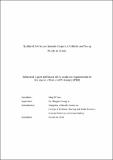| dc.contributor.advisor | Dr. Margaret Hodgins | |
| dc.contributor.author | O'Hara, Mary | |
| dc.date.accessioned | 2013-07-26T16:06:29Z | |
| dc.date.available | 2015-06-08T13:41:53Z | |
| dc.date.issued | 2013-05-28 | |
| dc.identifier.uri | http://hdl.handle.net/10379/3553 | |
| dc.description.abstract | The aim of this study was to explore quality of life issues of young people in Ireland with juvenile idiopathic arthritis (JIA). JIA is an autoimmune inflammatory disease diagnosed during childhood before the age of 16 with an incidence of 10-20/100,000. It is characterized by persistent synovial inflammation which can cause functional impairment, pain, and activity limitation; all of which may affect quality of life. Treatment modalities are not curative and aim to control the inflammatory process. This was a mixed methods study. To obtain multiple perspectives, young people with JIA were surveyed and parents and clinicians were interviewed.
Findings
The young people perceived that they had a good quality of life. Social support was found to be a protective factor in buffering the impact of juvenile arthritis. Parents had a strong role in buffering their children from adverse circumstances and promoting their children¿s quality of life.
Parental recognition of the practical difficulties that children were encountering and pride in their efforts to adapt to difficult situations was a major theme. Education, school services and future prospects were frequent issues. Socialization was considered very important. However, services and service organization for young people with JIA were frequently encountered as problematic. Safety considerations relating to the long-term effects of the newer biologic medications, and whether they had made the right choices for their children, were significant concerns for parents.
Conclusions
Person-centred care from an early age is needed to meet the needs of young people with JIA across their lifespan, to optimize their life opportunities and quality of life. Service provision and service organization needs to be more collaborative and co-ordinated. A dedicated liaison person is needed to co-ordinate and support young people with JIA and their families to manage and adapt to the illness and improve their quality of life. Finally, families need more knowledge and information relating to the newer biologic medications. | en_US |
| dc.rights | Attribution-NonCommercial-NoDerivs 3.0 Ireland | |
| dc.rights.uri | https://creativecommons.org/licenses/by-nc-nd/3.0/ie/ | |
| dc.subject | Quality of life | en_US |
| dc.subject | Juvenile idiopathic arthritis | en_US |
| dc.subject | Health Promotion | en_US |
| dc.title | Quality of Life Issues: Juvenile Idiopathic Arthritis and Young People in Ireland | en_US |
| dc.type | Thesis | en_US |
| dc.local.note | This study examined the quality of life of young people in Ireland with the chronic disease of juvenile idiopathic arthritis. It gained the perspectives of young people, parents and clinicians. It was a small-scale exploratory study. The young people considered that they had a good quality of life their parents provided a more nuanced description of the situation. Parents and clinicians acknowledged that the newer medications had improved the quality of life of young people with this condition. | en_US |
| dc.local.final | Yes | en_US |
| nui.item.downloads | 2922 | |


